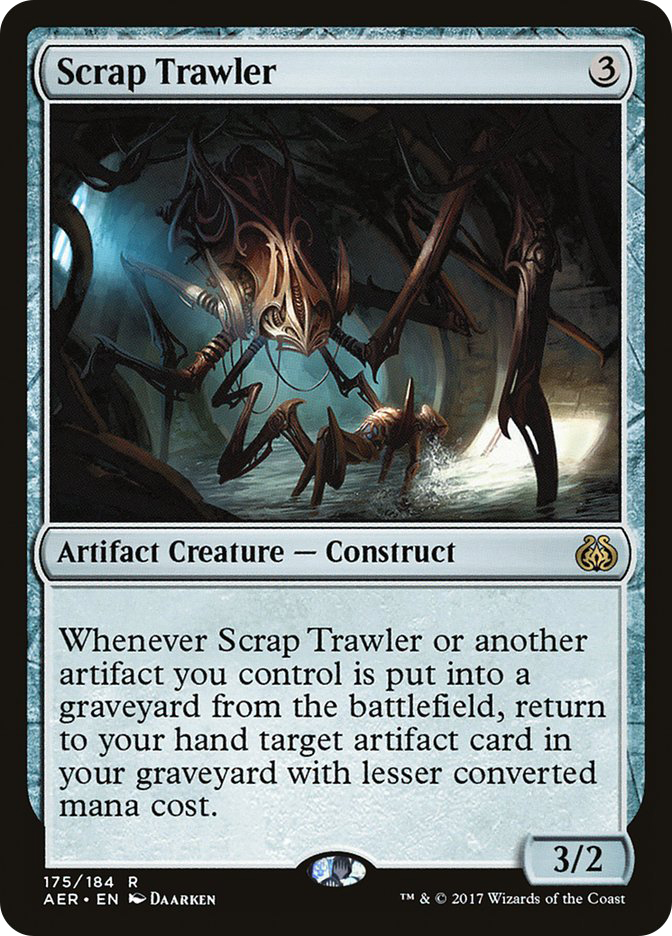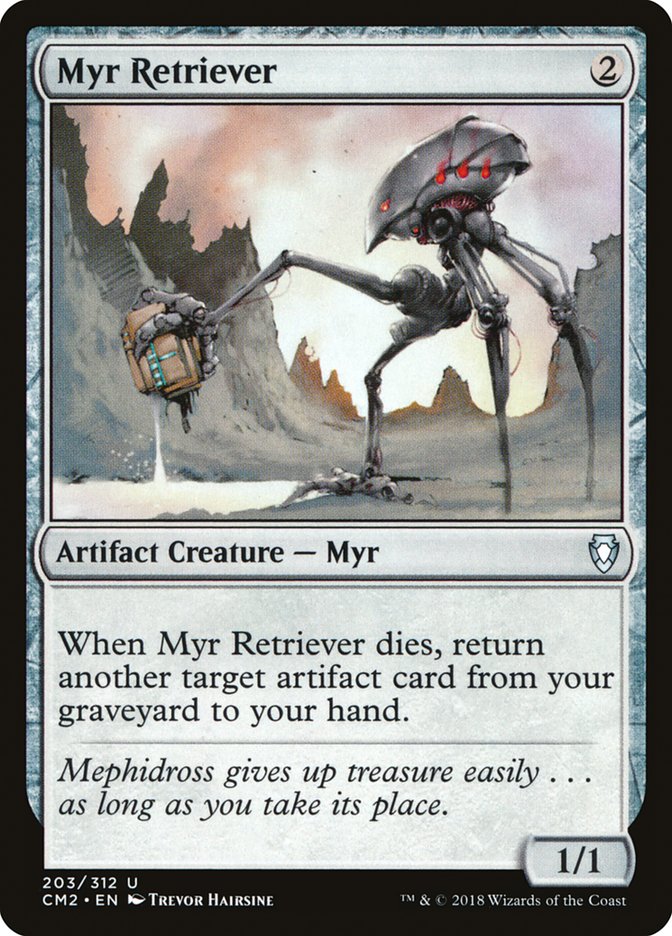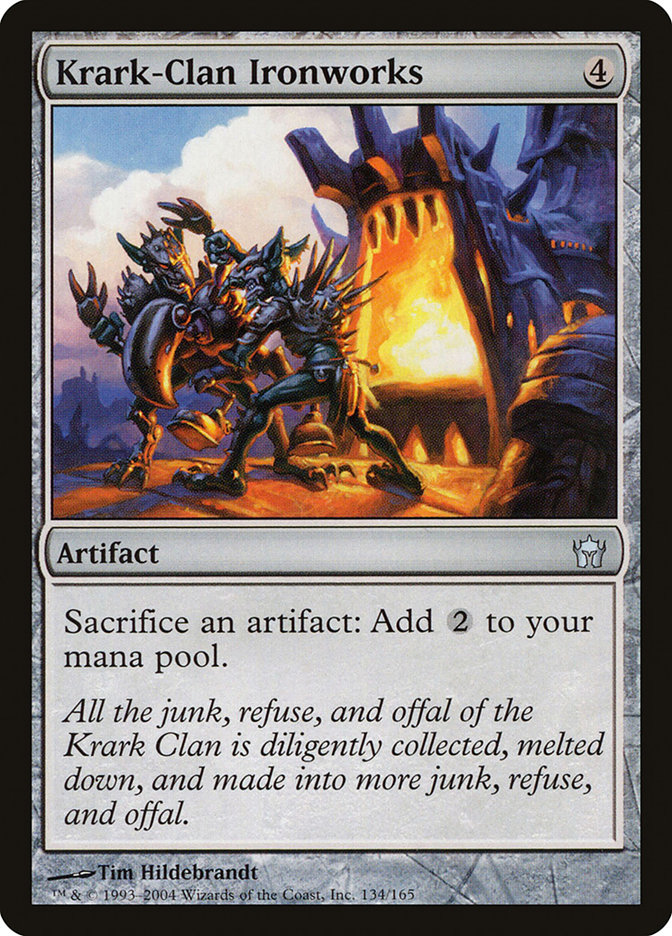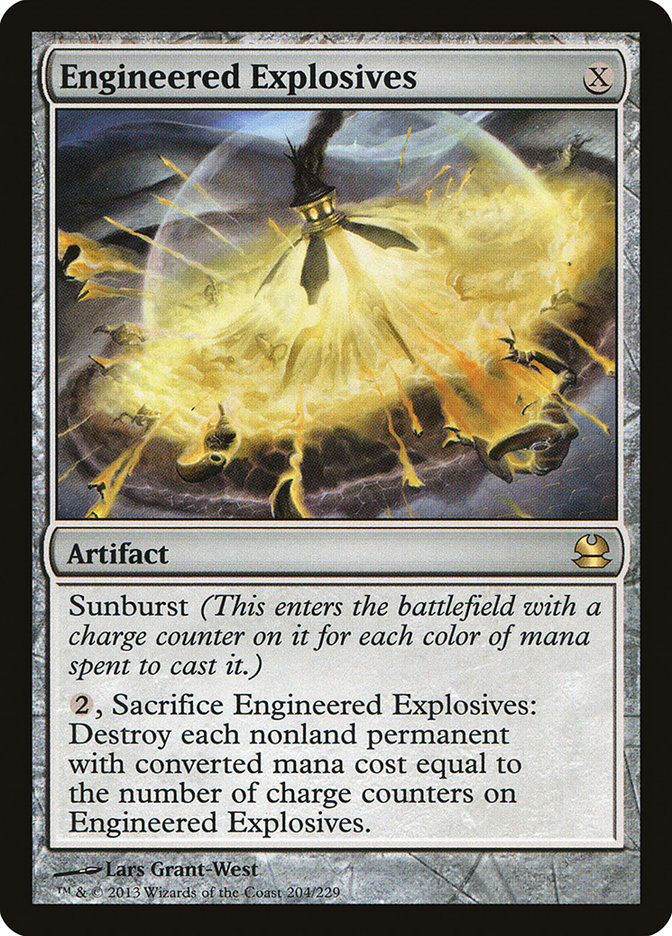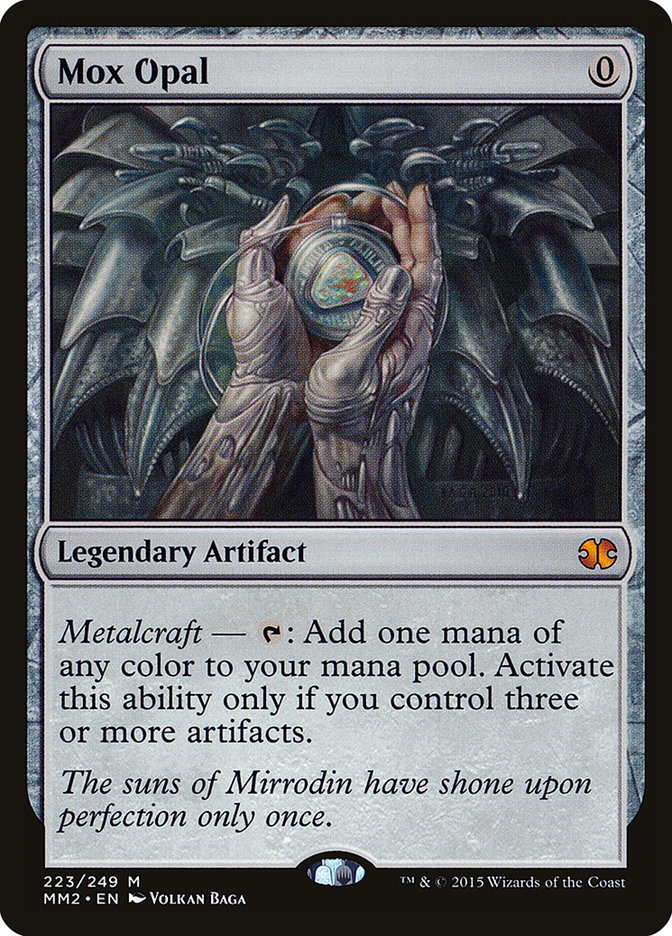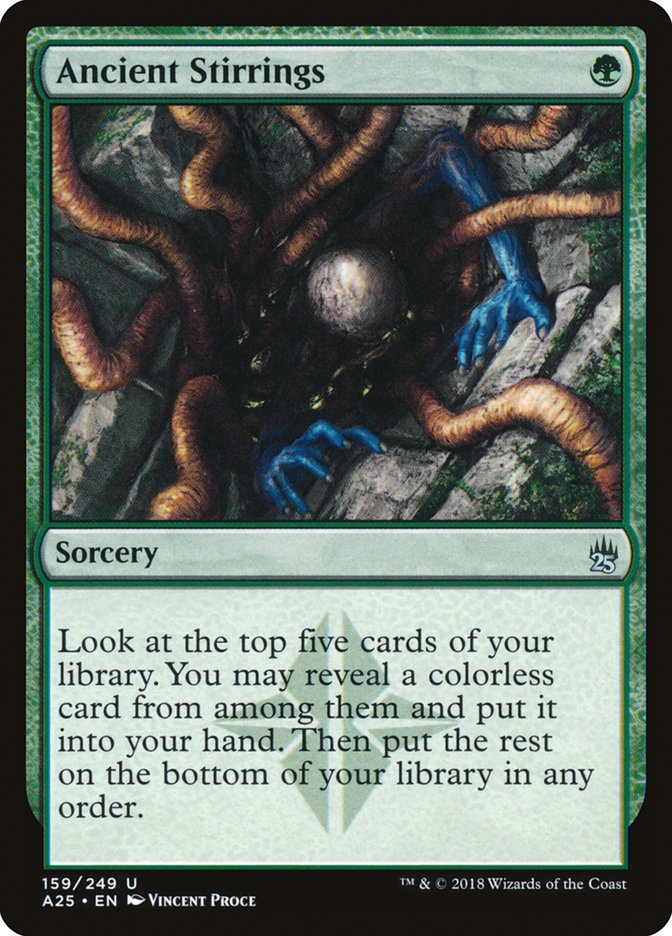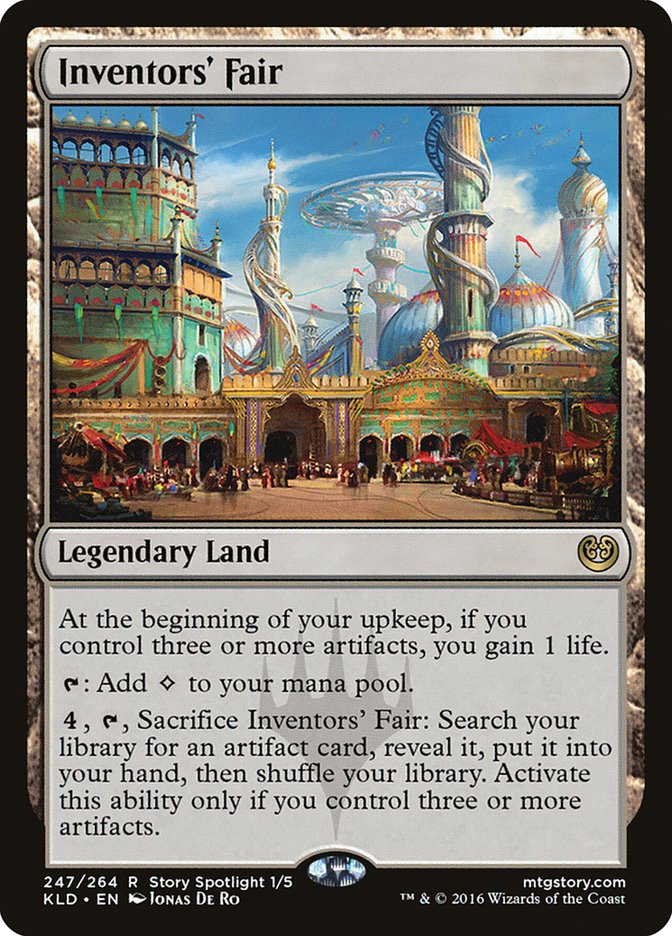Ironworks shouldn’t be a legal Modern deck.
Period.
Listen, I know what you’re thinking, “Are you serious? It isn’t even
oppressive. Zero copies in the
Top 32 of SCG Indianapolis
last weekend. What’s wrong with the deck?”
Simply put: the deck is bad for tournament Magic.
What the Deck Does
For those who have missed the Ironworks deck for the last couple of months
in Modern, take a look at this:
Creatures (6)
Lands (18)
Spells (36)

Ironworks namesake Krark-Clan Ironworks uses piles of artifacts that draw
cards when they die, in conjunction with Scrap Trawler, to draw its deck.
Until a few months ago, the deck would eventually cast a copy of Emrakul,
the Aeons Torn or Banefire to kill the opponent, having generated a mass of
cards and mana.
Then, Matt Nass discovered a trick that makes the deck faster and more
consistent while also removing the need for the clunky finisher cards that
tend to be dead until the combo turn.
Buckle up, because things are about to get rules-y.
In the basics of casting spells in Magic, we tend to just pay costs, choose
targets (if necessary), and put our spell onto the stack, when it’s more
complicated than that. We shortcut through most of it, but
putting things in the most technical terms
, casting a spell has several steps, including the “paying costs” step.
During the step that a player is casting a spell, if that spell has a cost
(as in, more than zero mana without any additional costs), the spell’s
caster may activate mana abilities in order to pay the spell’s mana cost.
Stay with me. Look at Krark-Clan Ironworks:
That’s a mana ability.
During the steps of casting a spell, no triggered abilities are going to be
placed on the stack until the spell itself is placed onto the stack.
Further, the rules allow for players to add more mana than necessary to
their mana pool than is required for the spell, meaning that a player can
activate any number of mana abilities during this step of casting a spell.
This means that if a player were to cast a spell, say, a Chromatic Star,
they could sacrifice Myr Retriever and Scrap Trawler (in that order) to pay
for the Chromatic Star. After paying costs for the Chromatic Star, the Star
would be placed on the stack, and its controller then chooses how to order
Myr Retriever’s and Scrap Trawler’s triggers on the stack, at the same
time. The Scrap Trawler sees both creatures die, meaning the Scrap Trawler
can return the Myr Retriever from the graveyard with the trigger requiring
something that costs less than three, and the ‘Trawler trigger from the
Retriever returns something that costs less than one. Then, the Myr
Retriever’s own ability returns the Scrap Trawler.
Why is this relevant, and why does it have to be done so specifically?
Normally, when sacrificing creatures to abilities, it must be done one at a
time, and the abilities would be placed onto the stack as soon as a
creature died. In this same example, if the creatures weren’t dying
“simultaneously” (read: at a time during which no abilities can be placed
on the stack), Myr Retriever wouldn’t have the ability to return the Scrap
Trawler from the graveyard, because its ability would have to be placed on
the stack before another ability could be activated.
The extra card that the loop returns in each iteration makes it fairly
academic for the Ironworks player to draw their entire deck, and with the
help of a zero-mana artifact, make infinite mana, before eventually killing
the opponent with a Pyrite Spellbomb.
The necessity for zero-mana artifacts led to the other recent innovation in
Ironworks: maindeck copies of Engineered Explosives.
Engineered Explosives functioning as both interaction and a combo piece
simultaneously is equal parts genius and problematic. The most common way
to interact with combo decks that cast several spells in the same turn,
frequently use their graveyard, activate several abilities, or use
artifacts, are hate cards that punish players for doing so or make it
impossible to do it past a certain point.

All these cards can be destroyed with Engineered Explosives. Heck,
Sorcerous Spyglass and Pithing Needle don’t even turn off most of the
abilities in the deck due to their being mana abilities.
Engineered Explosives is one of the most ubiquitously played cards in
Modern entirely on the back of its versatility. Fair decks tend to keep at
least one copy in their sideboard as a catchall to problematic, sticky
permanents they may end up playing against.
On top of that, Engineered Explosives doesn’t just answer one permanent;
it’s a sweeper. The deck that’s currently playing the “hatebears” game in
Modern is Humans, and there’s something important that most of its
disruptive pieces have in common:

They cost two mana.
More costly hate-cards aren’t safe either. With Aether Hub and Spire of
Industry commonly showing up in lists and the deck playing Terrarion,
Chromatic Sphere, and Chromatic Star as enablers, making all five colors of
mana is a cinch.
Looking past the fact that Ironworks can use Engineered Explosives as an
incredibly proactive versatile resource, as mentioned previously, it’s a
combo piece. It fits in the “Krark-Clan Ironworks-plus-Myr
Retriever-plus-Scrap Trawler-plus-zero-mana artifact equals infinite mana”
loop.
At the risk of sounding like Billy Mays…
there’s more! On top of being a combo piece and an absurd standalone Magic
card, it also plays into the artifact synergies of the deck.
Metalcraft enabler? Yup.
Can be found by the deck’s cantrip? Naturally.
Tutorable in a pinch? I’m not writing this section for nothing!
The card plays so many roles in the deck, and when taken out of a fair
context, forces us to confront just how many boxes it can check when abused
in the proper shell.
With Engineered Explosives’ ability to answer problematic permanents, the
natural conclusion one would draw is to try attacking the deck with spells.
Cue that Saffron Olive tweet that I won’t let die:
The moment that really got me was the first time KCI Scrap
Trawlered back their Myr Retriever in response to my
extripate.Split Second ain’t what it used to
be.— Chris Botelho (@CBotelhoMagic) July
9, 2018
The recursion from Scrap Trawler being a trigger without an activation cost
means that players can try to interact with part of the combo, and the
Ironworks player can generally just respond for enough advantage to recur
the piece that is disrupted, and keep going from there.
With such a great engine, the implied understanding of complex rules,
resistance to spell-based interaction, and the best sideboard card in
Modern as a maindeckable combo-piece, one would think that the deck
wouldn’t have trouble winning. Wrong.
Take a look at this VS Series video featuring Todd Anderson and Brad
Nelson:
Todd starts comboing at 11:57, combos for four minutes just playing his
cards as he draws them, and then doesn’t win the game. The deck can take a
long time to assemble what’s effectively a combo that requires four or more
cards, particularly when each action is something that can be responded to
by the opponent, this can take a lot of time.
I experienced this firsthand during the first round of
#SCGPhilly
just a few weeks ago.
After going through multiple copies of Kambal, Consul of Allocation, a
Leyline of the Void, and three hand-disruption effects, my Ironworks
opponent started going off with a couple of minutes left on the clock.
Then they kept going.
Then kept going.
And going.
I eventually won on the first turn of extra turns after time in the round
was called.
Eleven minutes later.
You read that correctly. One turn from my opponent took almost fifteen
minutes. Admittedly, there were a handful of actions that could have been
performed faster, mechanically speaking, but due to one of their Myr
Retrievers being exiled from the earlier Leyline of the Void/Thoughtseize
interaction, they just had to go until they could establish their loop and
ended up fizzling.
Adding to the already nightmarish amount of time that the combo took,
because there had been an issue with a player’s sleeves in our match, we
had a ten-minute time extension. These factors combined to the second
round’s pairings not going up for almost half an hour after time was called
during the first.
This isn’t acceptable in tournament Magic. Even looking past what the deck
is capable of doing, having an archetype that can regularly stall hundreds
of people for an extra 25% of a round’s worth of time is not acceptable.
As a matter of fact, we’ve been down through this before. Think back to the
May 3, 2013 Banned and Restricted announcement
:
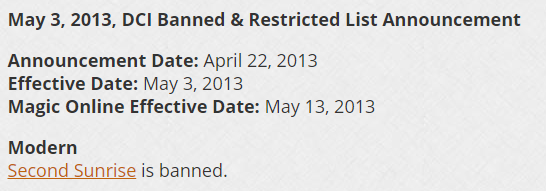
The reason given?
”
Modern tournaments have recently been diverse, with no dominant deck.
However, large tournaments have had a problem with the Eggs deck,
causing rounds to take significantly longer.
The deck uses
Second Sunrise
and
Faith’s Reward
to get back cards that generate mana, such as
Lotus Bloom
, and various artifacts that draw a card. A common choice to win the
game is
Pyrite Spellbomb
. However, the way the player gets to the point of forcing a win might
involve casting
Second Sunrise
so many times that the entire library is drawn, and only cards put back
with
Conjurer’s Bauble
are left. A single turn might take fifteen minutes or more.
In a large tournament, such as a Grand Prix, when time for the round
expires, players are given five additional turns to complete their
game. Usually, this takes a few minutes to conclude the rest of the
games. However, a player playing Eggs might have a fifteen-minute turn
during the additional turns, delaying the start of the next round by
ten minutes or more (beyond the next-longest match). Over the course of
a day, this can mean an extra hour of waiting for everyone else in the
tournament.”
A deck that takes a ton of time to eventually win with a Pyrite Spellbomb?
Non-dominant but detrimental to the actual processes involved with running
paper Magic tournaments?
That sure sounds familiar!
Even looking past the precedent set by Second Sunrise a half-decade ago and
the logistical side of things, how much fun is Ironworks adding to the
format? Staring at a player play every card in their deck, one card at a
time, isn’t fun. Having to play against a combo deck that can play
Engineered Explosives to answer permanents and Silence to answer spells,
with ways to cycle through its deck for both, isn’t fun.
Having to play against this style of deck is exhausting and feeling
hopeless in the face of it doesn’t make it much better. “Stony Silence or
bust” is so incredibly demoralizing.
To the “But I like playing these kinds of deck!” crowd: Believe it or not,
I’m in your camp. Take a look at the first orders I ever placed on
StarCityGames.com:

I played Eggs from the time it was called “Sunny Side-Up” in Extended until
it got hit by the ban hammer. Sometimes it’s time to admit that there are
cards that create incredibly negative play experiences for those involved,
and when those strategies become too common, something’s gotta give.
Blazing Shoal, for example, isn’t banned because it’s overpowered.
Literally any deck in the format can play Gut Shot to have a soft-answer to
the combo. Second Sunrise isn’t banned because it’s overpowered. They’re
banned because they create incredibly unfun situations in the context of
the format.
What to Not Do
Something must go, but what? Starting at the usual suspects, let’s rule a
couple of things out from the get-go:
Ancient Stirrings absolutely should not be banned in Modern. Sam Black and
Ryan Overturf had an adorable quarrel a couple of weeks ago on the subject,
and while I side with Sam’s
opinion on the issue
-as opposed to Ryan’s
take on things
– Sam loses me in the details.
Where we agree is in the belief that without Ancient Stirrings, entire
decks would cease to exist. Ancient Stirrings is legal while Ponder is not
because of power level, but it’s because there aren’t replacements for
Ancient Stirrings.
Amulet Titan isn’t going to turn to Mishra’s Bauble and Manamorphose if
Ancient Stirrings vanishes. Amulet Titan is going to fall off the map
because it can’t reliably execute its gameplan in a timely fashion.
Mono-Green Tron would completely fall off without a card in the vein of
Ancient Stirrings at its disposal.
Ponder being banned means that instead of losing the effect, blue decks
downgrade to Serum Visions and Opt.
Other than Ironworks, the Ancient Stirrings decks of the format are easily
metagamed against and counterable. Ironworks would still exist without
Ancient Stirrings, as a result, banning Stirrings isn’t a reasonable
solution.
Mox Opal is likely the most powerful card in Modern, but would also
severely hurt other decks if it were to be removed from the format.
On top of that, while Wizards of the Coast isn’t allowed to acknowledge the
secondary market, there comes a point at which it’s hard for the company to
completely ignore when a card retails for over $100. This isn’t to say that
expensive cards are unbannable, but in an Eternal format that WotC has made
a commitment to preserve the legitimacy of people’s investments and decks,
it would hurt consumer confidence by an enormous margin if a $100+ card
were to get banned and that banning were to also invalidate the strategies
that it was a part of as a result.
This one is quick and easy: Engineered Explosives isn’t a piece of the
strategy that the deck couldn’t recover from. It would weaken the deck, but
it wouldn’t kill it. Ironworks could play different answers if it needed
maindeck interaction and could throw in some Welding Jars if it wanted a
different zero-mana artifact for velocity.
The fact that Engineered Explosives traditionally operates to also keep
some of the harder-to-interact-with strategies in check, like G/W Hexproof
and Lantern Control, in check does a lot to make a case for its necessity
in the format.
What to Do
There are two options that Wizards of the Coast can take with the deck:
maiming and killing. Depending on the goal, the card to ban shifts
dramatically.
If WotC were interested in hurting the deck to the point that it couldn’t
function in its current capacity, the card to hit is Scrap Trawler. The
deck’s ability to turn each artifact it draws into more mana and more cards
is what has gained it the respect that it commands today.
Without Scrap Trawler providing such an enormous amount of resources to the
deck, it would be forced to use the old Eggs-reminiscent Faith’s
Reward/Open the Vaults-engine that it played as a fringe deck around 2015:
Creatures (2)
Lands (17)
Spells (41)

This deck is….worse. For a lot of reasons.
When decks like Ironworks and Eggs aren’t hyper-competitive, they tend to
take less time in rounds due to the fact that people don’t bring them to
competitive tournaments as frequently. People don’t tend to travel for
hours, pay hundreds of dollars in travel costs and entry fees, and deal
with everything else that comes with going to competitive tournaments for
the sake of playing a “meme” deck.
Kill it. Kill it with fire.
What Wizards of the Coast needs to do is ban Krark-Clan Ironworks.
There isn’t a fair upside to having Krark-Clan Ironworks in the format.
People aren’t registering Krark-Clan Ironworks in their deck in hopes of
sacrificing a couple of artifacts to cast Wurmcoil Engine or Ugin, the
Spirit Dragon. That’s the
other colorless ramp deck.
Ironworks’ key piece creates a handful of situations, ranging from “One
player plays a ton of Magic before not winning the game enough to justify
playing the deck at competitive events,” all the way to “One player plays a
ton of Magic in a fashion that is hard to prevent and can cause a
tournament’s run-time to go through the roof.”
There are other ways to play linear combo decks that kill in more
deterministic and faster ways. U/R Gifts Storm is very real–just ask Caleb
Scherer. There are other busted Mox Opal decks. There are other absurd
Ancient Stirrings decks.
I imagine that this time next week we’ll be very tired of watching
Ironworks as it adds additional time to Pro Tour Minneapolis. You know
what’s worse than one player sitting on their hands while the other player
at the table tries to announce upwards of one hundred triggers in the same
turn? Five players sitting at a table watching someone go through the same
motions.
Krark-Clan Ironworks is taking away more from the format than it’s giving,
and it’s high time that Wizards acknowledged it.
Yours truly,
The woman who hates Modern bannings more than anyone in the world.


